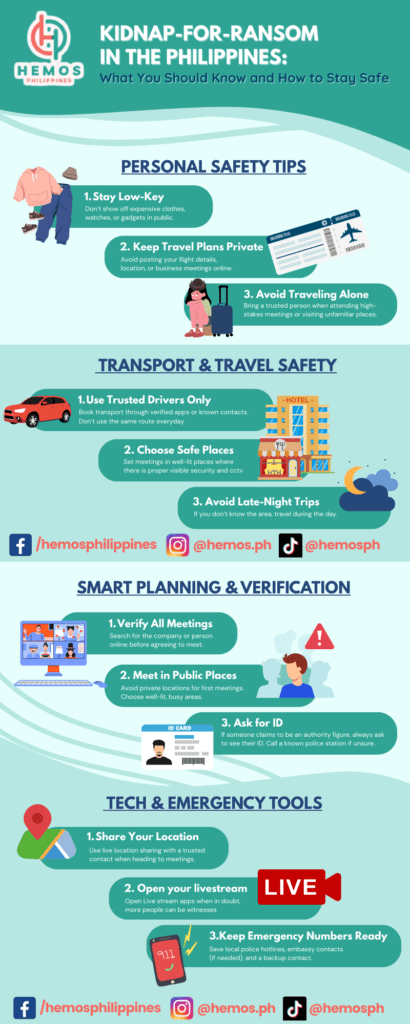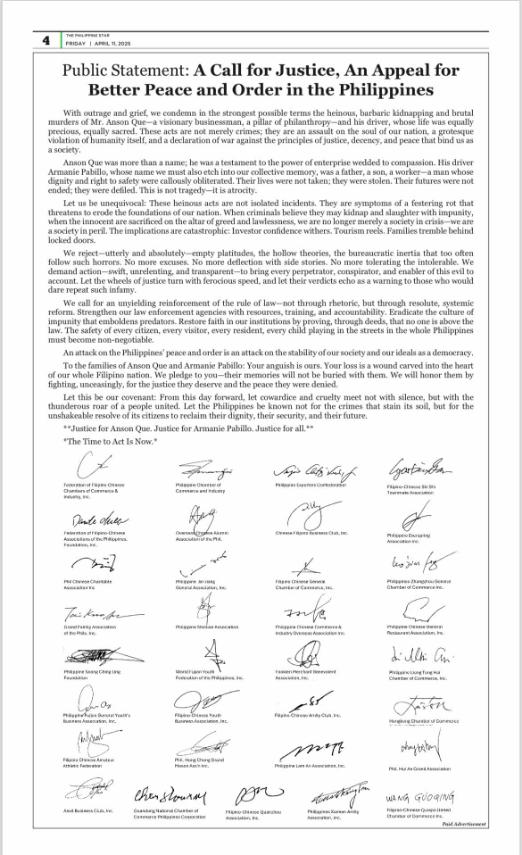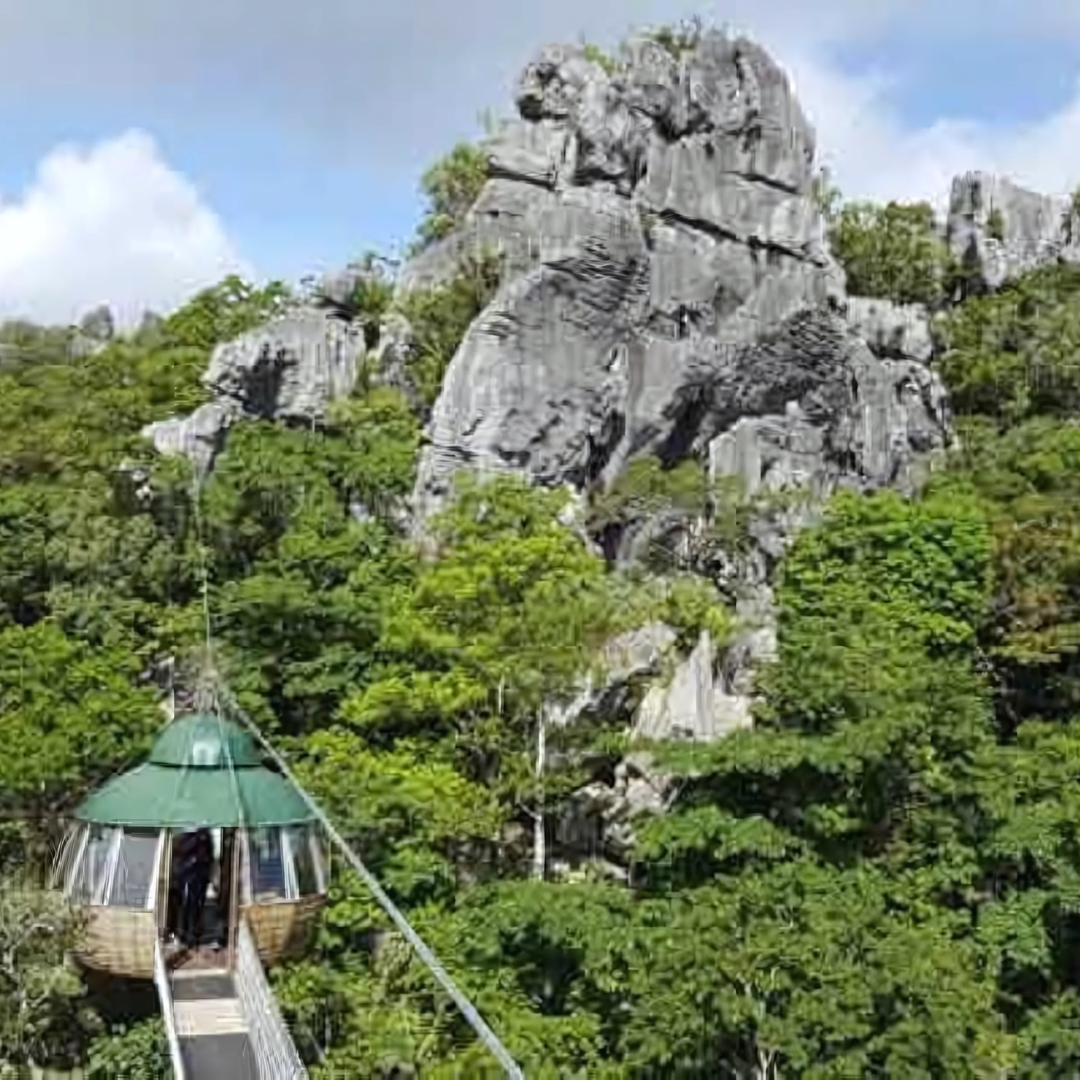Kidnap for ransom isn’t just a story on the news anymore. It’s happening more often—and it’s targeting people who are just trying to do business, travel, or live their lives. And if you think it only happens to the wealthy, think again. The tactics are getting bolder, the targets more varied, and the consequences more brutal.
Let’s talk about what’s really going on, what tactics these criminals are using, and most importantly—how you can protect yourself and your family.
This Isn’t Just a Scare Tactic—It’s Really Happening
Two recent cases show how dangerous the situation has become:
- June 2024 – Two foreign executives flew into the Philippines to explore business deals. They were kidnapped soon after landing. A ransom was paid—but both were found dead in Camarines Sur. The case was cold-blooded, calculated, and deeply disturbing.
- April 2025 – Local businessman Anson Que and his driver were abducted in Valenzuela City. Despite paying ransom, both were later found dead in Rodriguez, Rizal. The killings shocked the local business community.

These aren’t isolated events. They’re part of a pattern. Organized criminals are watching, planning, and waiting. And they’re getting help—from inside.
Why Are Businesspeople Being Targeted?
Criminals don’t act at random. They choose people who seem like they have money, influence, or access. Some common reasons victims are targeted:
- They look like they have money – Flashy clothes, cars, watches, or frequent social media posts about success attract attention.
- They’re involved in deals – Meetings about land, business, or investments often mean large amounts of cash are involved.
- Criminals have inside info – It could be a driver, hotel staff, or even a friend of a friend feeding details to criminals.
- Law enforcement struggles to keep up – Police are often understaffed, under-equipped, or lack coordination to respond quickly.
These crimes aren’t always carried out by lone wolves. Increasingly, they’re carried out by groups who know the area well, have access to weapons, and may even be connected to corrupt insiders.
Common Tricks Used by Kidnap for Ransom Groups
Understanding their tactics is your first line of defense:
- Fake Business Deals – Victims are invited to fake meetings and deals.
- Surveillance at Airports – Criminals watch for likely targets as soon as they land.
- Insiders Helping Out – Staff at hotels, restaurants, or even a hired driver may be part of the setup.
- Impersonating Police – Criminals may pose as officers, show fake IDs, and take people “in for questioning.”
- Changing Vehicles – Victims are sometimes transferred between vehicles to confuse rescuers.
Criminals are also known to use technology, including tracking devices and online surveillance, to monitor a target’s movements.
How to Protect Yourself in the Philippines
You can’t control everything. But you can lower your risks with some common sense steps:
1. Plan Like Safety Matters—Because It Does
- Use travel agencies or local contacts you trust.
- Don’t travel alone if it can be avoided, especially to new places.
- Hire security for important business meetings or large financial transactions.
- Don’t use the same route to/from work
2. Stay Low-Key
- Leave the expensive stuff at home.
- Don’t post your location or travel plans online.
- Avoid talking about moneyor big transactions in public.
3. Verify Before You Meet Anyone
- Research people and companies before setting appointments.
- Only meet in secure, public areas
- Be cautious with unsolicited invitations, especially if they promise big returns.
4. Pick Safe Locations and Transport
- Stay somewhere with good security.
- Use trusted transport services (not just any Grab or private car).
- Always confirm your driver’s identity.
- Avoid hotel rooms with shared or unsecured access points.
5. Keep People in the Loop
- Share your plans with someone you trust.
- Set check-in times and stick to them.
- Create a safe word that signals danger.
6. Be Smart About Law Enforcement
- Don’t go with anyone claiming to be an officer without proper identification
- Call a known police station to verify if unsure.
- If stopped on the road, stay in your vehicle and contact someone immediately, open a live feed just in case.
7. Use Tech for Safety
- Turn on live location sharing.
- Keep a second phone or panic button with you.
- Use apps with emergency call functions.
- Have a battery pack to keep your phone charged at all times.

What the Government and Community Can Do
This isn’t just a personal issue—it’s a public one. Communities and government bodies need to step up against kidnap for ransom groups:
- Train Law Enforcement – Provide better training and tools to investigate and respond to kidnapping cases.
- Raise Awareness – Barangays, schools, and business chambers can help educate communities.
- Create Alert Networks – Community groups can form private alert systems to report suspicious activity.
- Improve Emergency Hotlines – Ensure they’re easy to reach, available 24/7, and linked to rapid-response teams.
- Better Regulation of Transport and Hospitality Industries – Monitor hotels, drivers, and handlers more closely.
Important Resources to Keep On Hand During Emergencies
| Resource | Purpose | Contact Info |
|---|---|---|
| PNP Anti-Kidnapping Group (AKG) | Report and request help on kidnapping cases | (02) 8723-0401 loc. 8804 / 0917-629-5003 |
| National Bureau of Investigation (NBI) | For investigations and reports | (02) 8523-8231 to 38 |
| Emergency Hotline (Nationwide) | Any emergency | 911 |
| Department of Justice (DOJ) | Legal support and criminal prosecution | (02) 8523-8481 |
This wave of kidnap for ransom attacks is a serious problem—and it’s not going away soon. The people behind these crimes are bold, organized, and connected. They know who to target and how to make their plans work. The outcries for the PNP to strengthen peace and order policies and operations have been full fledged as of now.

But you can make it harder for them. Be careful who you trust. Stop sharing too much online. Always let someone know where you’re going. And treat your safety like a daily priority—not an afterthought.
If you’re doing business in the Philippines—or your family is—take these risks seriously. Staying safe doesn’t mean living in fear. It means staying one step ahead.
Stay smart. Stay safe. Don’t let them make you the next story.
Check these sources out: GMA News, ABS CBN news, Inquirer
stay updated, click here!





